Related Research Articles

The North Pole, also known as the Geographic North Pole or Terrestrial North Pole, is the point in the Northern Hemisphere where the Earth's axis of rotation meets its surface. It is called the True North Pole to distinguish from the Magnetic North Pole.
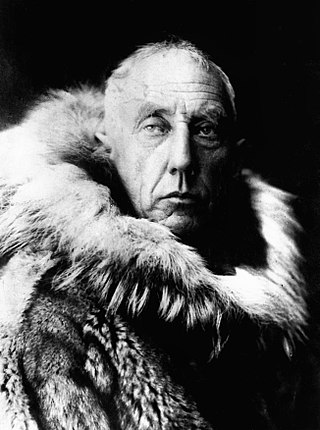
Roald Engelbregt Gravning Amundsen was a Norwegian explorer of polar regions. He was a key figure of the period known as the Heroic Age of Antarctic Exploration.

Robert Edwin Peary Sr. was an American explorer and officer in the United States Navy who made several expeditions to the Arctic in the late 19th and early 20th centuries. He is best known for, in April 1909, leading an expedition that claimed to be the first to have reached the geographic North Pole.

Ann Bancroft is an American author, teacher, adventurer, and public speaker. She was the first woman to finish a number of expeditions to the Arctic and Antarctic. She was inducted into the National Women's Hall of Fame in 1995.

A nuclear-powered icebreaker is an icebreaker with an onboard nuclear power plant that produces power for the vessel's propulsion system. As of 2022, Russia is the only country that builds and operates nuclear-powered icebreakers, having built a number of such vessels to aid shipping along the Northern Sea Route since the Soviet times. Nuclear-powered icebreakers are much more powerful than their diesel-powered counterparts. Although nuclear propulsion is expensive to install and maintain, very heavy fuel demands, limitations on range, and difficulty refueling in the Arctic region can make diesel vessels less practical and less economical overall for these ice-breaking duties.
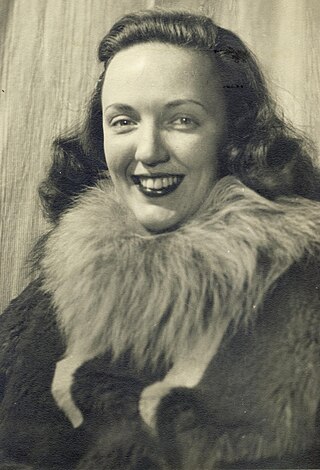
Jackie Ronne was an American explorer of Antarctica and the first woman in the world to be a working member of an Antarctic expedition (1947–48). She is also the namesake of the Ronne Ice Shelf.
David Buchan was a Scottish naval officer and Arctic explorer.
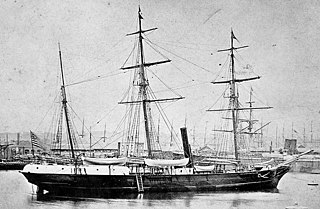
USSJeannette was a naval exploration vessel which, commanded by George W. De Long, undertook the Jeannette expedition of 1879–1881 to the Arctic. After being trapped in the ice and drifting for almost two years, the ship and her crew of 33 were released from the ice, then trapped again, crushed and sunk some 300 nautical miles north of the Siberian coast. The entire crew survived the sinking, but eight died while sailing towards land in a small cutter. The others reached Siberia, but 12 subsequently perished in the Lena Delta, including De Long.

Artur Nikolayevich Chilingarov is an Armenian-Russian polar explorer. He is a corresponding member of the Russian Academy of Sciences, he was awarded the title of Hero of the Soviet Union in 1986 and the title of Hero of the Russian Federation in 2008. He is the president of State Polar Academy. Chilingarov is a member of the United Russia party; he was a member of the State Duma from 1993 to 2011, and again from 2016 onwards and was the representative of Tula Oblast in the Federation Council between 2011 and 2014.

50 Let Pobedy is a Russian Arktika-class nuclear-powered icebreaker.

USS Polaris, originally called the America, was an 1864-screw steamer procured by the Union Navy as USS Periwinkle during the final months of the American Civil War. She served the Union Navy's struggle against the Confederate States as a gunboat.
Matty L McNair is an American explorer. She now lives in Iqaluit, Nunavut, Canada on Baffin Island, where she runs her company NorthWinds. Among her many accomplishments are:
Clare O'Leary is an Irish gastroenterologist, mountain climber and adventurer. She was the first Irish woman to climb Mount Everest and complete the Seven Summits.

Xue Long is a Chinese icebreaking research vessel. Built in 1993 at Kherson Shipyard in Ukraine, she was converted from an Arctic cargo ship to a polar research and re-supply vessel by Hudong–Zhonghua Shipbuilding of Shanghai by the mid-1990s. The vessel was extensively upgraded in 2007 and 2013.

HMS Alert was a 17-gun wooden screw sloop of the Cruizer class of the Royal Navy, launched in 1856 and broken up in 1894. She was the eleventh ship of the Royal Navy to bear the name, and was noted for her Arctic exploration work; in 1876 she reached a record latitude of 82° North. Alert briefly served with the US Navy, and ended her career with the Canadian Marine Service as a lighthouse tender and buoy ship.
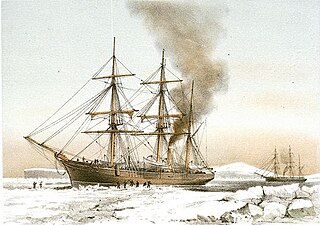
HMS Discovery was a wood-hulled screw expedition ship, and later storeship, formerly the sealing ship Bloodhound built in 1873 in Dundee. She was purchased in 1874 for the British Arctic Expedition of 1875–1876 and later served as a store ship. Discovery was sold in 1902, reverting to the name Bloodhound and her previous sealing trade. The ship was wrecked in Newfoundland in 1917.

The South Pole, also known as the Geographic South Pole, Terrestrial South Pole or 90th Parallel South, is the southernmost point on Earth and lies antipodally on the opposite side of Earth from the North Pole, at a distance of 12,430 miles in all directions. It is one of the two points where Earth's axis of rotation intersects its surface.

Felicity Ann Dawn Aston is a British explorer, author and former climate scientist.
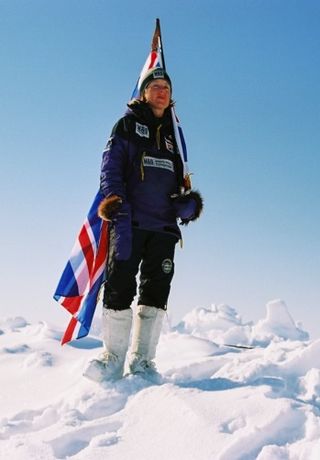
Ann Daniels is a British polar explorer and motivational speaker. She and her team-mate Caroline Hamilton were the first women to reach both the North Pole and South Pole as part of all-women teams, in 2002.

Maria Leijerstam is a British polar adventurer. In 2013 she became the first person to cycle to the South Pole from the edge of the continent. Leijerstam started her expedition on the Ross Ice Shelf at the edge of the Antarctic continent, and cycled for 10 to 17 hours each day with no rest days, and the total distance cycled was 638 km (396 mi). Leijerstam's cycle was a three wheeled design, and she reached the pole faster than any previous skiing expedition.
References
- ↑ "Biography on the website of female adventurers". Archived from the original on 2014-05-02. Retrieved 2017-10-02.
- ↑ Ledertoug, Christina (16 November 2010). "Bettina Aller har født tvillinger". Ekstra Bladet . Retrieved 30 June 2014.